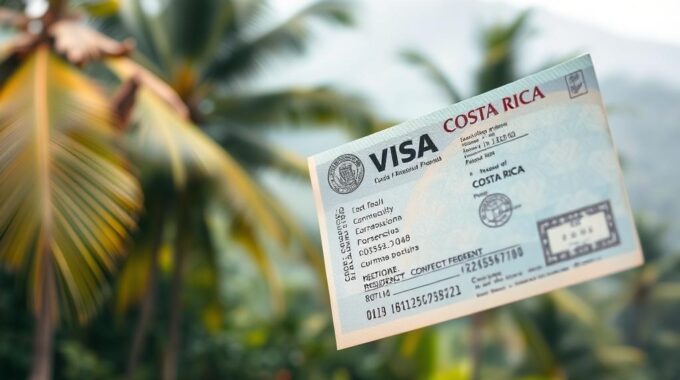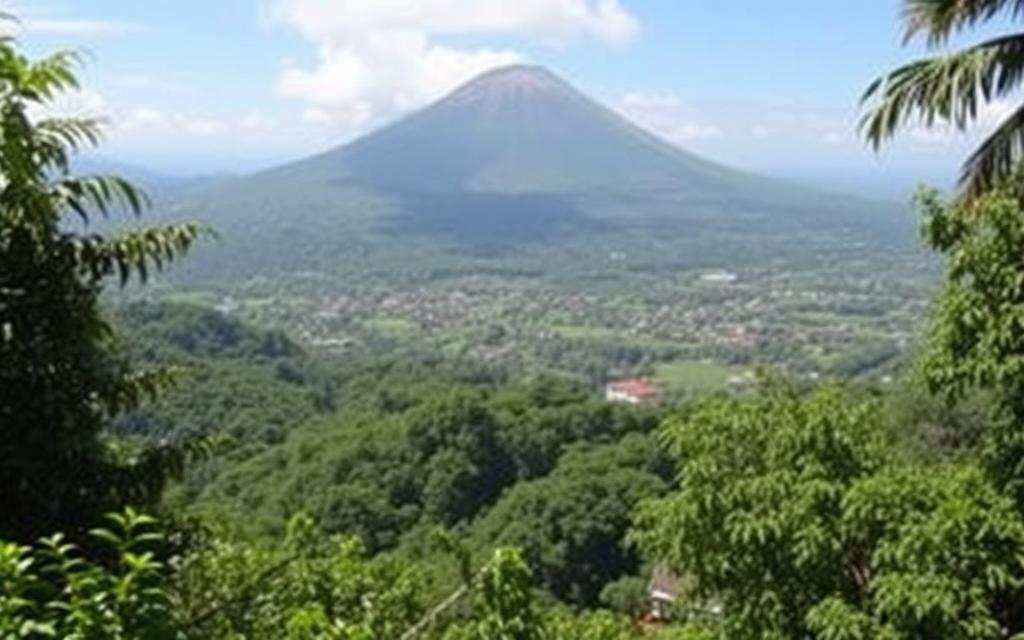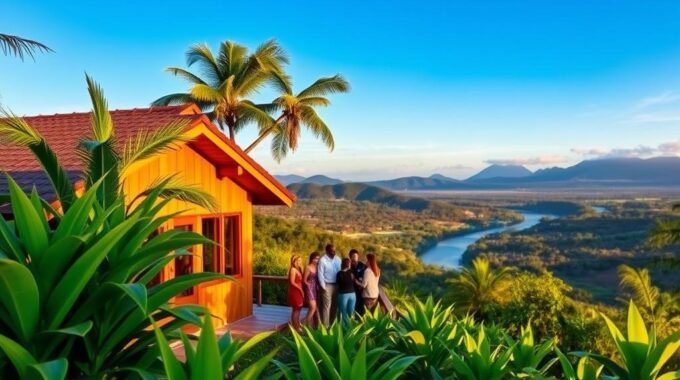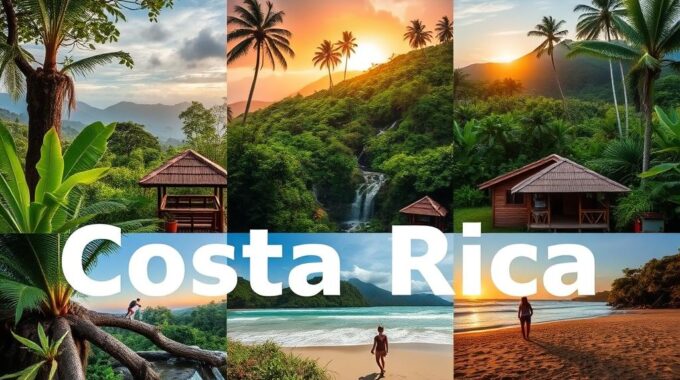Discover private lending online communities Costa Rica with GAP Investments. Secure loans from $50,000 with competitive rates. Learn more.

How Much to Invest for Costa Rica Residency
Nearly 70,000 Americans have chosen Costa Rica as their new home, with this number growing by 14% annually since 2020. Costa Rica’s unique blend of natural beauty, political stability, and high-quality healthcare has made it an attractive destination for those seeking a tropical paradise.
Costa Rica Immigration Experts (CRIE), with over 20 years of experience, has helped numerous clients achieve their dream of living in this Central American nation. Understanding the financial requirements for residency is crucial for a smooth transition.
The country offers multiple pathways to residency, each with specific investment requirements. The minimum investment for the Inversionista residency program is $150,000, which can be invested in real estate, business ventures, or government-approved projects.
Understanding Costa Rica’s Residency Investment Options
For those considering relocation, Costa Rica offers a variety of residency options tailored to different financial situations and goals. Costa Rica’s immigration system is designed to attract foreign investment and talent, providing several pathways to residency.
Overview of Costa Rica’s Popularity for Foreign Residents
Costa Rica has become an attractive destination for foreign residents due to its stable economy, rich biodiversity, and welcoming culture. The country’s popularity among expats and retirees is on the rise, driven by its high standard of living and relatively straightforward residency processes. As a result, many individuals are exploring the various residency options available.
The Different Pathways to Residency in Costa Rica
Costa Rica’s residency programs cater to a diverse range of applicants. The Pensionado program is ideal for retirees with a stable pension or retirement income. The Rentista program serves individuals with steady passive income, while the Inversionista program targets those willing to invest in Costa Rican businesses or real estate. Additionally, the Digital Nomad visa offers a temporary residency option for remote workers. To learn more about these options, you can explore your Costa Rica residency options.
The various residency categories come with different requirements, benefits, and limitations. For instance, the Pensionado program requires a minimum monthly income of $1,000, making it accessible to many retirees. In contrast, the Inversionista program requires a significant investment of at least $150,000 in Costa Rica.
The Inversionista (Investor) Residency Program
The Inversionista Residency Program in Costa Rica offers a unique opportunity for investors to obtain residency through a significant investment. This program is particularly attractive to foreign investors due to its straightforward requirements and the benefits it offers.
Minimum Investment Requirement of $150,000
The Inversionista program requires a minimum investment of $150,000. This investment can be made in various forms, providing flexibility for investors.
The verification process for the investment includes thorough documentation of the source of funds and proof that the money has been transferred into Costa Rica through official banking channels, ensuring compliance with Costa Rican regulations.
Qualifying Investment Types
Investors have several options to qualify for the Inversionista program. Some of the most popular choices include:
- Real estate investments, such as residential properties, commercial buildings, or undeveloped land valued at $150,000 or more.
- Business investments include starting a new company, purchasing an existing business, or making a significant capital contribution to an established enterprise in Costa Rica.
- Investments in government-approved projects focused on sustainable development, renewable energy, or infrastructure.
- Agricultural investments in areas like coffee plantations, tropical fruit production, or sustainable forestry projects.
- Tourism-related investments, such as boutique hotels, eco-lodges, or tour operations, have proven successful for many foreign investors.
These investment options not only facilitate residency but also contribute to Costa Rica’s economy and align with the country’s commitment to environmental conservation.
Other Residency Options Beyond Investment
While investment is a popular pathway to residency in Costa Rica, it’s not the only option for those seeking to make the country their home. Costa Rica offers various alternatives that cater to different needs and preferences, including retirees, individuals with stable income, and remote workers.
Pensionado (Retiree) Residency
The Pensionado residency is designed for retirees who can prove a stable pension income of at least $1,000 per month. This option is particularly appealing to those who have a steady income from abroad.
Rentista (Income-Based) Residency
For individuals who are not retirees but have a stable income, the Rentista visa is a viable option. Applicants must demonstrate a monthly income of at least $2,500 from a reliable source outside Costa Rica.
Digital Nomad Visa
Launched in 2021 and refined in 2023, the Digital Nomad visa is tailored for remote workers employed by foreign companies or with clients outside Costa Rica. Key requirements include a stable income of at least $3,000/month for individuals or $4,000/month for families, health insurance, and a clean criminal record.
- Stable income of $3,000/month for individuals or $4,000/month for families
- Employment with a foreign company or clients outside Costa Rica
- Health insurance covering the entire stay in Costa Rica
- No requirement to pay into the Costa Rican healthcare system (CAJA)
- Tax exemption on foreign-earned income
Real Estate Investment for Costa Rica Residency
Costa Rica offers a unique opportunity for individuals to gain residency through real estate investment. The country’s law now allows purchasing a property to qualify for the investor category, making it an attractive option for those looking to relocate.
Property Requirements for Investor Visa
The Costa Rican law specifies that any type of real estate can be used for the investor visa, including homes, land, or buildings. The key requirement is meeting the minimum investment threshold of $150,000.
To qualify, the property must be purchased in the name of the applicant and registered with the relevant authorities.
Popular Locations for Real Estate Investment
Costa Rica has various regions that are popular for real estate investment, each offering unique benefits.
- The Central Pacific region, including areas like Jacó and Manuel Antonio, offers beachfront and ocean-view properties.
- The Central Valley, encompassing San José, Escazú, and Santa Ana, is ideal for those seeking urban properties with modern amenities.
- Guanacaste province features luxury developments in areas like Tamarindo, Flamingo, and Nosara.
- The Southern Zone, including Dominical, Uvita, and Ojochal, attracts investors looking for larger properties with jungle and ocean views.
- Emerging areas like the Caribbean coast and Lake Arenal region offer investment opportunities at lower price points.
Business Investment Options for Residency

For those interested in obtaining residency in Costa Rica, business investment is a viable pathway. The country has a history of welcoming foreign investors, and the investment requirements can be met through various business ventures.
Starting a Business in Costa Rica
Starting a business in Costa Rica can be an attractive option for investors. The process involves establishing a company that can contribute to the local economy. Investors should be aware that starting a new venture may require additional time and resources to establish a customer base and obtain necessary permits.
Investing in Existing Costa Rican Businesses
Investing in existing Costa Rican businesses can offer several advantages, including established operations and immediate cash flow potential. Investors can acquire shares in local companies, ensuring the investment amount is properly documented to meet the $150,000 minimum threshold. Due diligence is crucial when investing in existing businesses, involving a thorough examination of financial records, legal compliance, and potential liabilities.
Popular acquisition targets include tourism businesses, restaurants, and service companies catering to both locals and expatriates. Partnership arrangements with Costa Rican nationals can provide valuable local knowledge, though the foreign investor must still meet the minimum investment requirement independently.
How Much to Invest for Costa Rica Residency: Total Costs
The total cost of investing in Costa Rica residency encompasses more than the minimum investment requirement. While the initial investment is a significant factor, other expenses must be considered to ensure a smooth application process.
Beyond the $150,000 Minimum: Additional Investment Considerations
Investing in Costa Rica’s residency program requires more than just meeting the $150,000 minimum investment threshold. Applicants must consider additional financial commitments that can impact their overall application and residency experience.
The type of investment chosen can significantly affect the total costs. For instance, investing in real estate may require additional due diligence services, which can range from $500 to $1,500, to ensure the property meets all legal requirements and is properly valued for residency purposes.
Government Fees and Official Expenses
Government fees and official expenses are a crucial part of the residency application process in Costa Rica. These costs, although not as significant as the initial investment, are essential for the successful processing of the application.
Applicants should budget for these official expenses to avoid any unexpected financial burdens during the application process.
Attorney and Professional Service Fees
Professional legal assistance is highly recommended for navigating Costa Rica’s residency process. Attorney fees can range from $600 for basic application guidance to $5,000 for comprehensive services, depending on the complexity of the application and the level of service required.
- Translation services for required documents typically cost $30-60 per page.
- Due diligence services for business or property investments add $500-1,500.
- Accounting and tax advisory services, particularly important for business investors, typically cost $500-2,000.
While these professional fees represent a significant expense, they often prevent costly mistakes and delays that could jeopardize both the investment and the residency application.
To get the most accurate pricing and service options tailored to your specific situation, it’s advisable to consult with immigration experts who can consider all factors, including family size and document requirements.
The Complete Residency Application Process
To successfully obtain residency in Costa Rica, applicants must understand and complete the various stages of the application process. This involves careful preparation and adherence to specific requirements.
Document Collection and Authentication
The first step in the residency application process is collecting and authenticating the necessary documents. This includes gathering personal identification, financial statements, and other relevant paperwork, which must then be authenticated according to Costa Rican requirements. For detailed guidance on the required documents and authentication process, applicants can consult with Costa Rica Immigration Experts.
Submitting Your Application
Once all documents are collected and authenticated, the next step is submitting the application. This involves presenting the complete application package to the relevant Costa Rican authorities. It’s crucial that all documents are in order to avoid delays or rejection.
Navigating the Waiting Period
After submission, the application enters a review phase that can last from 3 to 12 months, depending on the residency category and current processing volumes. During this period, applicants can legally stay in Costa Rica and must obtain a DIMEX card appointment. They must also enroll in the CAJA (Costa Rican healthcare system) once they receive provisional approval. Travel outside Costa Rica requires an exit permit to avoid application cancellation.
The waiting period for different residency categories varies, with Pensionado taking 8-12 months, Rentista taking 6-10 months, Inversionista taking 4-8 months, Digital Nomad taking 2-3 months, and Family-relation residency taking 3-6 months. Applicants must remain in Costa Rica or request permission to leave during this time.
Benefits of Obtaining Residency Through Investment
The benefits of securing residency through investment in Costa Rica are multifaceted, offering a pathway to a more stable and secure future.
Residency through investment not only provides a chance to live in a beautiful country known for its biodiversity and welcoming culture but also opens up various legal and financial opportunities.
Legal Rights as a Costa Rican Resident
As a resident of Costa Rica, individuals gain certain legal rights that enhance their quality of life.
These include the right to live in Costa Rica without the need for frequent visa renewals
and the ability to own property.
Residents also have access to the country’s healthcare system, known as CAJA,
and can drive using their foreign driver’s license for a certain period.
Path to Permanent Residency and Citizenship
Initially, investor residency grants temporary status valid for two years,
requiring renewal before expiration to maintain legal residency in Costa Rica.
After three years of temporary residency, investors can apply for permanent residency,
which offers more stability and fewer restrictions, including the ability to work without special permits.
Furthermore, after seven years of continuous residency, individuals become eligible to apply for Costa Rican citizenship,
provided they demonstrate Spanish language proficiency and pass a civics exam.
Common Mistakes to Avoid When Investing for Residency

Applicants for Costa Rican residency via investment frequently make avoidable mistakes that complicate the process. Documentation problems are a primary cause of delays in residency applications. To ensure a smooth process, it’s crucial to understand the common pitfalls.
Common errors include improper documentation of investment funds, purchasing property through a corporation, undervaluing property, and navigating the process without legal assistance. Maintaining the investment and understanding work restrictions are also vital.
To avoid these issues, create a detailed document checklist, have an attorney review your documents, and budget for all associated costs. By being aware of these potential mistakes, applicants can ensure a successful residency application process in Costa Rica.
Expert Guidance from Costa Rica Immigration Experts

Costa Rica Immigration Experts (CRIE) has been a trusted name in assisting individuals achieve their dream of living in Costa Rica. With over 20 years of experience and thousands of successful residencies, CRIE is one of the oldest and most trusted immigration firms in the country.
CRIE’s comprehensive services include document preparation, application submission, and follow-up with immigration authorities, ensuring a smooth process for their clients. Their team of immigration attorneys and consultants provides personalized advice tailored to each client’s unique situation.
For personalized consultation regarding residency investment options and costs, prospective residents can contact CRIE directly.
Conclusion
The Costa Rican residency investment pathway offers a compelling blend of financial commitment and personal reward, making it an attractive choice for prospective residents.
Investing in Costa Rica residency represents a significant but rewarding commitment. Beyond the initial $150,000 investment, prospective residents should budget for additional costs, including government fees and professional services, to ensure a smooth transition to life in Costa Rica.
Working with experienced immigration professionals significantly improves the likelihood of application success. Start your residency process today, and you’ll be on your way to enjoying the benefits of Costa Rican residency, including its natural beauty, political stability, and high-quality healthcare.


